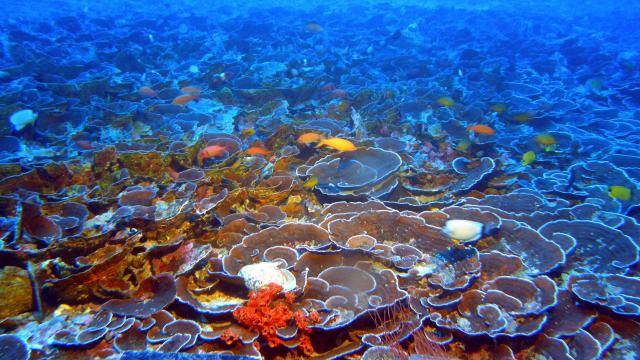Hawaii legislators approved a bill this week that would ban sunscreen containing the ingredients oxybenzone and octinoxate, an ingredient in 3500+ of the world’s most popular brands which has been linked to the death of coral reefs.
A 70m deep coral reef in the Au’au Channel off Maui, Hawaii, in 2009. Photo: NOAA (AP)
Per the Honolulu Star-Advertiser, the bill passed near-unanimously with just four out of 76 legislators opposing. State Sen Mike Gabbard told the paper that the legislation is the first of its kind anywhere in the world:
Despite opposition from retail and health industry representatives, the Senate voted for the bill unanimously, while four members of the House – Rep Isaac Choy, Rep Sharon Har, Rep Sam Kong and Rep Bob McDermott – voted against it.
“Amazingly, this is a first-in-the-world law,” said Gabbard in an email. “So, Hawaii is definitely on the cutting edge by banning these dangerous chemicals in sunscreens. When you think about it, our island paradise, surrounded by coral reefs, is the perfect place to set the gold standard for the world to follow. This will make a huge difference in protecting our coral reefs, marine life, and human health.”
Companies that make sunscreen lotion such as L’Oréal and their trade associations opposed the new regulations, citing a lack of evidence, but the compelling scientific research behind the rules seems to have won.
Democratic Gov David Ige hasn’t indicated whether he’ll sign the bill, but its final passage is likely enough that Hawaiian businesses have already begun to purge the brands of sunscreen that might be banned, according to NPR.
A 2015 study in Environmental Contamination and Toxicology by international researchers including the University of Central Florida’s professor John Fauth concluded that oxybenzone deforms coral larvae in such a way that they end up trapped in their skeletons, hindering their ability to spread across the ocean.
They also concluded that it damages coral DNA and contributes to bleaching, a phenomenon in which corals belch out the symbiotic algae inside them and may subsequently starve to death. Levels used in the study were approximate to those found in ocean waters as a result of the ingredients being washed out of beach-going crowds.
“The use of oxybenzone-containing products needs to be seriously deliberated in islands and areas where coral reef conservation is a critical issue,” co-author Craig Downs told The Washington Post. “We have lost at least 80 per cent of the coral reefs in the Caribbean … Any small effort to reduce oxybenzone pollution could mean that a coral reef survives a long, hot summer, or that a degraded area recovers.”
Other studies have found that both octinoxate and oxybenzone could stunt the growth of developing corals.
Though scientists are wary that other factors such as other runoff and warming water due to climate change play a much bigger role in damaging corals, according to Nature, the chemicals in question could further damage reefs’ ability to survive systemic damage to their ecosystems. According to NPR, some 14,000 tonnes of sunscreen lotions washed off of swimmers are estimated to end up in coral reefs.
Coral is under threat worldwide, with assessments released in 2017 estimating half of the planet’s coral is already dead, with a 90 per cent death rate likely by 2050. Reefs support billions of dollars in marine industry, but more importantly, they also harbour one out of four animal species that live in the oceans – and if they’re eliminated, the effects on other marine life could be devastating.
Australia recently pledged $500 million to save the Great Barrier Reef following findings that an oceanic heat wave in 2016 had caused around a third of the reef to die off, though researchers concluded the harm was irreversible.
Scenarios in which global average surface temperatures rise more than 2C, which seems likely, would be catastrophic to reefs everywhere, but even more moderate warming scenarios such as a 0.5C rise still anticipate massive harm to coral ecosystems.
[Honolulu Star-Advertiser via NPR]
